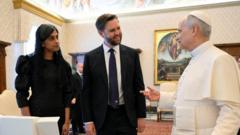In a historic announcement, Pope Leo XIV declared that Carlo Acutis, a London-born Italian teen recognized for his deep spirituality and love for technology, will be canonized on September 7, 2025. Initially, the ceremony was set for April 27 but was postponed following the death of Pope Francis. Carlo, who died in 2006 at the age of 15, is lauded for his remarkable life that resonated with the youth, marked by daily church attendance and a website chronicling Eucharistic miracles. His rapid ascent to sainthood reflects a changing landscape in the Catholic Church, making him the first millennial saint just 19 years after his death. Many young pilgrims have visited his tomb in Assisi, especially after his beatification in 2020. Alongside Carlo, Pier Giorgio Frassati, another significant figure in the Church’s history, will also be canonized, promising a momentous event in St. Peter's Square.
Pope Leo XIV Announces Canonization of First Millennial Saint

Pope Leo XIV Announces Canonization of First Millennial Saint
The Vatican confirms Carlo Acutis to be canonized on September 7 after postponement due to Pope Francis's passing.
In the wake of Pope Francis’s death, the Vatican sees Carlo Acutis's upcoming canonization as a beacon of hope for younger generations. Carlo has captured the hearts of many, leading to the establishment of chapels and schools in his honor globally. His life, characterized by spirituality and kindness, serves as an inspiration within the context of modern challenges, showcasing a model of Christian virtue that resonates today.
Carlo Acutis’s story highlights the intersection of faith and youth culture in contemporary society. His journey emphasizes the Church's responsiveness to the needs of the faithful, particularly the younger demographic facing an uncertain future. This canonization not only marks an important event for the Church but also signals a shift toward embracing technological and cultural advancements as avenues for spiritual growth.
Carlo Acutis’s story highlights the intersection of faith and youth culture in contemporary society. His journey emphasizes the Church's responsiveness to the needs of the faithful, particularly the younger demographic facing an uncertain future. This canonization not only marks an important event for the Church but also signals a shift toward embracing technological and cultural advancements as avenues for spiritual growth.




















